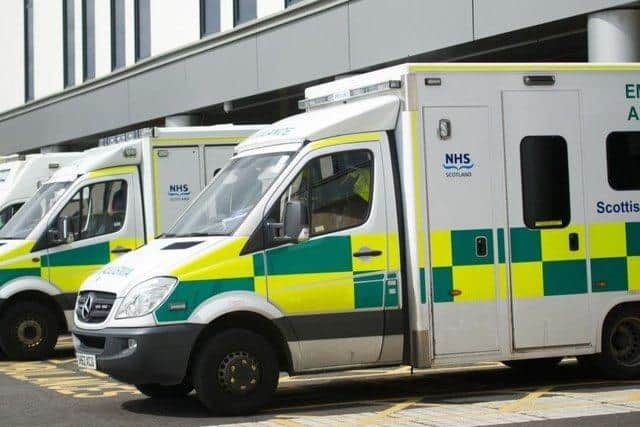Huge rise in ambulance calls cancelled because patient made own way to hospital
Data obtained from the Scottish Ambulance Service (SAS) shows 5,796 calls relating to non-attended incidents were “stopped” due to patients choosing to make their own way in 2021/22.
This is up from just 753 occasions in 2016/17, a rise of 670 per cent.
Advertisement
Hide AdAdvertisement
Hide AdFor attended incidents, the number of calls stopped due to patients making their own way rose from 405 in 2016/17 to 2,330 in 2021/22, a rise of 475 per cent.


Calls to clinical support desks show similar figures, with calls relating to non-attended incidents rising from 2,215 in 2016/17 to 6,924 in 2021/22 and calls relating to attended incidents rising from 34 in 2016/17 to 113 in 2021/22.
The figures for the financial year 2021/22 only go up to November.
Ambulance bosses said the service had “evolved” over the last five years, meaning they also provide care for patients who are “less acutely unwell”.
But Scottish Liberal Democrat leader Alex Cole-Hamilton, whose party obtained the figures, said they “suggest that more and more people may be having to take themselves to the hospital because emergency care simply isn’t there”.
He said: “While we can only hope those thousands of patients had only very minor injuries that required very little assistance, we do not know if the choice to make their own way to the hospital was merely a preference or a necessity.
“If thousands of people are having to take a taxi to the A&E rather than wait at home in pain for an ambulance that may or may not come then that is an indictment of the SNP’s handling of emergency care.”
A SAS spokesman said: “The SAS has evolved over the past five years and as well as providing emergency responses to time-critical patients, also provides person-centred care to patients who are less acutely unwell, working in partnership with patients, their carers and families.
Advertisement
Hide AdAdvertisement
Hide Ad“These clinical interactions can take place remotely by telephone or video link, or face to face with patients in communities.
"This can mean that final decision about the best option for patients can be self-care or treatment provided by SAS, or making their own way, either to hospital or to other healthcare providers, such as pharmacies, minor injury units or out-of-hours centres which are closer to home.
“In some cases where we are experiencing delays, we advise patients of the length of delay and if safe and appropriate the patient may make an informed choice to use their own transport.
"In addition, during the pandemic some patients have preferred to travel in their own transport to enable them to be with family members.”
A Scottish Government spokesman said it is “fully committed to ensuring the SAS has the resources and skilled staff in place to continue to deliver a high quality emergency health service”.
He said: “Despite many challenges – especially during the pandemic – including serving some of the most rural areas in the UK, in 2020/21 our ambulance crews responded to over 70 per cent of their highest priority calls in under 10 minutes and over 99 per cent in under 30 minutes.
"Patients with serious and urgent conditions will always be prioritised.
“Increased Scottish Government investment has seen record recruitment of 540 additional ambulance staff in 2021/22, as well as increases in staff at hospital sites and in control rooms."
Comments
Want to join the conversation? Please or to comment on this article.
